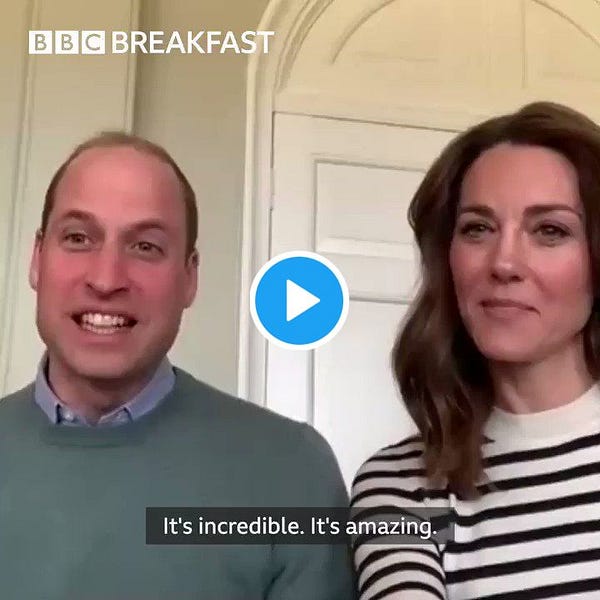The Last Thing I Will Write About Parks and Recreation
Well I couldn’t just let it go unnoticed.
When I wrote previously about some of my issues with Michael Schur’s TV shows, I thought that was all I had to say. It ended up becoming by far the most read thing on this newsletter and even led to freelance work at Vanity Fair. I hadn’t intended to write any more on the subject, but I hadn’t intended to live through a global pandemic that prompted Schur et al to make a new Parks and Recreation special, so here we are. Enjoy!
Thomas “Captain Tom” Moore wanted to do his bit and help out. The last time his country faced a crisis on this scale was the Second World War, and he was out on the front line. This time, he was weeks away from his one hundredth birthday, and so the British government asked him and his peers to self-isolate while the virus was particularly dangerous. But Tom wasn’t going to sit around and do nothing while people were in need. He decided to complete laps walking around his garden, raising money for the National Health Service (NHS) in the process. His initial target was to raise £1000.
As of writing this, “Captain Tom” has raised £32.8 million for the NHS.
The campaign, which came to include a charity single that went straight to number one in the charts, attracted praise from far too many significant names to count.








It’s all well and good that he raised a lot of money, and god knows everyone could do with a feel good story right now. But here’s the thing: the NHS is not a charity. It literally says so on the first page of the document introducing the service to the public in 1948. The Prime Minister who oversaw its founding, Clement Atlee, believed charity to be “a cold grey loveless thing. If a rich man wants to help the poor, he should pay his taxes gladly, not dole out money at a whim”. We are living in extraordinary times, yes. But a basic need of society such as healthcare during a pandemic having to rely on charity should be a sign of great sadness, of a system failing to hold up its end of the bargain, not of celebration.
A Parks and Recreation Special was conceived with good intentions. Viewers were encouraged to join in with the show’s producers NBCUniversal in donating to Feeding America, a charity helping food banks to provide for the hungry during the pandemic. There will be people eating tonight who would otherwise have gone without thanks to A Parks and Recreation Special. But it’s a tragedy that it took a TV show to make it happen. Is this really a story we want to feel good about? That, in the richest country in the world, rich celebrities dance in order to hustle above average earners to pay for the meals of those really struggling? Parks never really sees this as a problem. It just thinks of the whole endeavour as a nice thing to do to help raise money for an important cause. And maybe it is. Maybe I’m being too mean here. But I can’t help feeling like this hits the limits of the show’s ideology.
Parks has always been an unashamed argument for the high minded ideas behind American democracy. It was a show that always believed the system could work, even as it hit serious obstacles from the Pawnee residents. To state the obvious, it was an argument for Obama era liberalism. What it doesn’t have (and, to be fair, it hardly can in a special like this) is any kind of answer for why that worldview has collapsed, not just in America but around the world. Is Donald Trump the President in the Parks and Recreation universe? Is he still botching the Covid response? As far as this episode is concerned, it may as well be President Hillary Clinton perfectly coordinating a test and trace strategy, such is its lack of engagement with any actual politics. In the real world, Parks’ vision of government fell apart shortly after the finale aired, but it doesn’t seem as though anyone involved noticed.
I’m honestly surprised at how little everyone involved has learned since 2015. The show’s longstanding depiction of Jerry (who now goes by Garry after a string of names, but I’m sticking with Jerry) has never sat well with me. Despite his well meaning nature, the characters made fun of him no end, tormenting him in a way that very frequently crossed the line into outright bullying. In one particularly bad example, we learn that Jerry suffers from asthma and April stole his inhaler, then refusing to give it back. You know, as a joke. Ha ha ha he might die. In A Parks and Recreation Special, the rest of the gang dread having to video chat with Jerry, as even listening to a nice if clumsy man for 30 seconds is apparently so intolerable to these people. None of them have worked with Jerry for several years at this point, but they remain so utterly disgusted by his existence that they avoid him at all costs. This is never treated by the show as cruel behaviour!
I always use the Jerry jokes as a case against Parks as a “nice” show, but perhaps I’m missing something. I certainly think the characters’ behaviour towards him is unacceptable in the workplace, but why does the show get away with it reputation intact? I wonder if it’s about framing. There are many great sitcoms about cruel people doing cruel things, but they generally tell us this deal upfront. We know we’re watching something mean and, in many of the better ones at least, we’re made to feel guilty for finding such behaviour funny. Parks never asks you to feel guilty for laughing at Jerry or chuckling along with the gang’s behaviour towards him. It doesn’t matter how cruel these characters are, because as long as the show gives them the seal of approval, it says it’s fine to feel warm and fuzzy about them.
As an episode of a TV sitcom produced in difficult circumstances, it was fine. It reminded you of things that were funny on the show without actually being funny itself. “Remember that thing you liked? It’s here again!” And that’s all it aspired to be. It wanted to make the audience feel slightly better about the world and encourage them to donate to a good cause. And maybe I’m just being a mean spoilsport here. Maybe I should recognise that they’re trying their best to help people.
But I can’t help but feeling like the tone of this thing is wildly out of touch. It wants to promise me we’ll get back to a past I’m increasingly sure never existed. It wants everything to be ok, to go “back to normal”, when I don’t accept its terms for normality in the first place.
You can’t make me feel better about the realities of the present by telling me a lie about the past.



Lighten up Francis! Your waaaaay over thinking Parks and Rec. It's just a show not reality.
They are well aware of their treatment of Jerry & they leave it untouched to remind us that even all the well- meaning folks out there have an ugly side. We are all of these characters & display all their traits in some way, at some point. They aren't perfect, neither are we. It shows EXACTLY how human nature may look one way but still has a dark side.